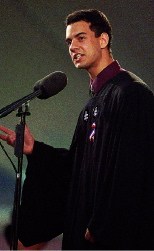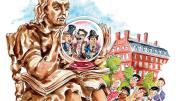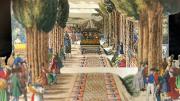I am one of you. But I am also one of "them." What do I mean? When I am told that this is a world at war, a war between the great civilizations and religions of the earth, I don't know whether to laugh, or cry. "What about me?" I ask. As a practicing Muslim and a registered voter in the Commonwealth of Massachusetts, am I, through the combination of my faith and my citizenship, an inherent contradiction?
 |
| Yasin: "The true American Dream is a universal dream, and it is more than a set of materialistic aspirations....This is our American Jihad." |
| Jim Harrison |
I think not. Both the Qu'ran and the Constitution teach ideals of peace, justice, and compassion, ideals that command my love, and my belief. Each of these texts, one the heart of my religion, the other that of my country, demand a constant struggle to do what is right.
I choose the word "struggle" very deliberately, for its connotations of turmoil and tribulation, both internal and external. The word of struggle in Arabic, in the language of my faith, is jihad. It is a word that has been corrupted and misinterpreted, both by those who do and do not claim to be Muslims, and we saw last fall, to our great national and personal loss, the results of this corruption. Jihad, in its truest and purest form, the form to which all Muslims aspire, is the determination to do right, to do justice even against your own interests. It is an individual struggle for personal moral behavior. Especially today, it is a struggle that exists on many levels: self-purification and awareness, public service and social justice. On a global scale, it is a struggle involving people of all ages, colors, and creeds, for control of the Big Decisions: not only who controls what piece of land, but more importantly, who gets medicine, who can eat.
So where is our jihad, where is our struggle as we move on from Harvard's sheltering walls? Worthy adversaries are innumerable. We can turn our struggle to the war against oppression, poverty, disease....But before looking outward, we must first look inward. Before deciding what we are against, we must decide what we are for. The only way to define the inner moral force that drives our struggle is to learn through actionto get our hands dirty. To strive to see the world as it sees itself, testing the boundaries of what we think we know, and how we know it. To combine our academic search for truth with a sense of empathy for our fellow humanityto seek Veritas in Humanitas.
On one level it's simple: everyone wants the same things that we do. The true American Dream is a universal dream, and it is more than a set of materialistic aspirations. It is the power and opportunity to shape one's own life: to house and feed a family, with security and dignity, and to practice your faith in peace. This is our American Jihad.
As a Muslim, and as an American, I am commanded to stand up for the protection of life and liberty, to serve the poor and the weak, to celebrate the diversity of humankind. There is no contradiction. Not for me, and not for anyone, of any combination of faith, culture, and nationality, who believes in a community of the human spirit.
Some of this is a mantra that has been spoken at myriad graduations. Worth repeating, perhaps, but nothing new. What is new was taught us by last fall's tragedy and carnage. The status quo is shattered, and we have now been forced to engage more closely the troubles of this world. We are in a privileged position to shape a more just, peaceful, and honorable global society.
So I ask again: where is our jihad? Whether on our way to an investment bank in New York, or to Sierra Leone to work with orphans, Harvard graduates have a responsibility to leave their mark on the world. So let us struggle, and let us make our mark. And I hope and pray that our children, our grandchildren, and those who take our seats in the years to come, will have cause to be proud.




